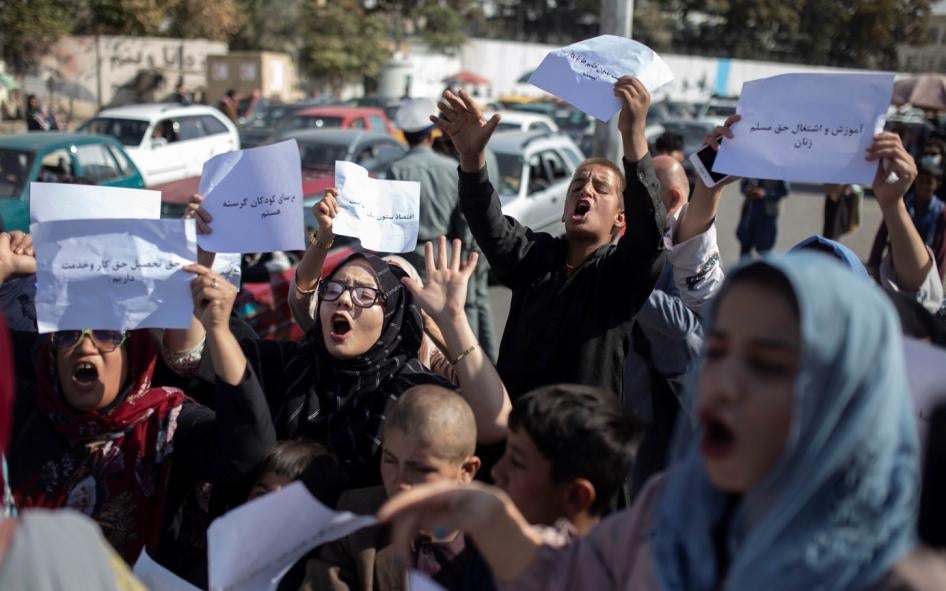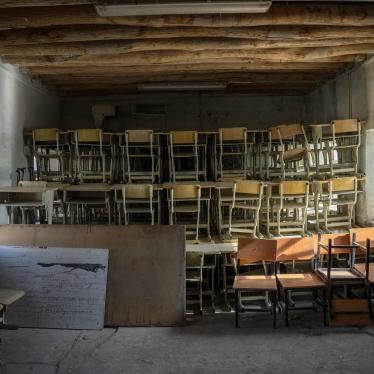(New York) – A United Nations Security Council-mandated independent assessment of the international approach to the crisis in Afghanistan should prioritize human rights, especially the rights of women and girls, Human Rights Watch said today in a submission to the special coordinator leading the assessment. The special coordinator should ensure that the assessment hears from survivors of human rights violations, and that the assessment offers recommendations to prevent and provide accountability for rights abuses.
A Security Council resolution in March 2023 asked the UN to conduct and provide to the Security Council, by November 17, “an integrated, independent assessment” with “forward-looking recommendations for an integrated and coherent approach among relevant political, humanitarian, and development actors” to the crisis in Afghanistan. The resolution called for the assessment to include consultations with relevant stakeholders, including Afghan women. In April, the UN secretary-general appointed Feridun Sinirlioğlu, who is a former senior Turkish government official, as the special coordinator.
“The situation in Afghanistan right now is the most serious women’s rights crisis in the world,” said Heather Barr, associate women’s rights director at Human Rights Watch. “The independent assessment could guide a more effective international response to this dire situation, but to do so, it needs to give priority to women and girls and other survivors of rights violations.”
Since taking control of Afghanistan in August 2021, the Taliban have stripped Afghan women and girls of most of their rights. Taliban abuses include banning girls and women from education above a sixth grade level, banning women from most employment, imposing severe restrictions on the ability of women and girls to travel and even leave their homes, banning women and girls from competitive sport, completely dismantling the system that had been developed to respond to gender-based violence, and a brutal crackdown including the torture and ill-treatment of women who have protested against these abuses.
The ban on women’s employment includes a ban on Afghan women working for international nongovernmental organizations and the UN. These bans have had the effect of cutting many women and girls, and other Afghans, off from desperately needed humanitarian assistance in a context where 28.8 million Afghans are in need of food aid.
The Taliban’s crackdown on the rights of women and girls continues to deepen, as evidenced by recent orders, including dismissing women from employment in kindergartens and the closure of all beauty salons, which were a major source of the remaining employment for women and a rare space where women and girls could find community and support outside their homes.
The women’s rights crisis in Afghanistan is happening in the context of a broader human rights and humanitarian crisis, with many other abuses as well as severe hardship for much of the population. Most Afghan humanitarian organizations – including those headed by women and those specifically seeking to reach women and women-headed households – lack funding to continue their work. The World Food Programme has had to cut eight million food-insecure Afghans from receiving assistance entirely. While the establishment of the Afghan Trust Fund alleviated some banking problems, serious problems remain, with the result that humanitarian groups, local businesses, and individuals cannot conduct bank transfers.
The Taliban’s crackdown has decimated the media. Journalists and others perceived to be critics, including among others the education activist Matiullah Wesa, have been jailed without due process. Torture of detainees is commonplace. The Taliban have targeted for abuse lesbian, gay, bisexual and transgender (LGBT) people and in many cases forced them into hiding.
The armed group Islamic State of Khorasan Province continues to carry out deadly attacks targeting civilians. Their widespread attacks on the Shia and Hazara communities constitute crimes against humanity.
“The crisis in Afghanistan is overwhelming, and Taliban abuses are deepening what was already a devastating humanitarian crisis,” Barr said. “The independent assessment should aim to urgently redirect the international community’s response to the situation in Afghanistan, which so far has been inconsistent, ineffective, and insufficiently focused on human rights.”
The special coordinator should ensure that his team includes experts on human rights, including on the rights of women and girls, and for these experts to be involved in every aspect of the assessment, Human Rights Watch said. The assessment process should be transparent and provide an opportunity for all stakeholders to provide submissions.
The assessment team should ensure that they hear from people who have personally experienced human rights violations, and the family members and associates of those arbitrarily detained, forcibly disappeared, or extrajudicially killed. They should actively seek to consult with women’s rights defenders, including women who have participated in public protests against Taliban abuses. They should also hear from girls, members of the Hazara and Shia communities and other minorities, LGBT Afghans, journalists including women journalists, and local Afghan-led humanitarian groups providing assistance.
“Afghan women and girls and others suffering under Taliban repression feel abandoned by the world,” Barr said. “The independent assessment should both help restore global attention to the situation in Afghanistan and propose concrete tools for holding the Taliban and other rights violators accountable.”








